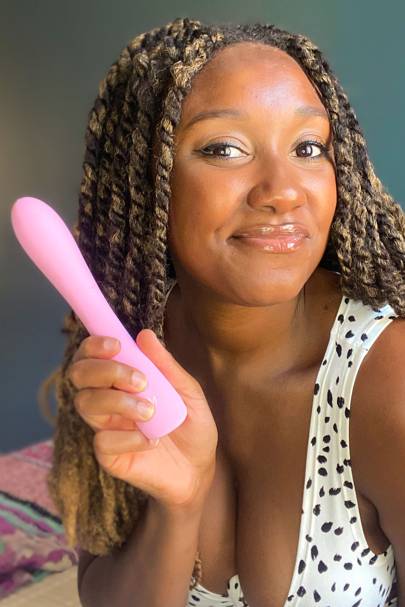If 2020 is the year we are rethinking everything; we may as well start with our sex lives.
Portia Brown, 28, is a sex educator based in New York and the founder of Froetic Sexology; a site dedicated to frank and supportive sex education which centres black women and femmes. It’s an inclusive space; and she prides herself on addressing the issues often forgotten in conventional sex education; discussions of consent, survivor-led sexuality, intersex and non binary sex and the intersectionality of race and sex.
She zooms me from her apartment in New York in early August, and we discuss her latest role as an ambassador for the amazing LGBTQ-owned sex toy brand, Kandid, a company as inclusive about sex as Portia is. It’s a partnership she’s inordinately proud of, not least because of how rare it is to see a woman of colour fronting a sexual wellness campaign of any kind.
“The more I’ve worked in this industry the more I have realised that there’s not a lack of black sex educators out there; its just that we are not getting the deals, the TV spots, the exposure,” she says, “When that happens it makes you feel like it isn’t for you- that lack of representation definitely had an impact on me! Not seeing myself made me feel like it wasn’t something I could do- that it was just for white women.”
She tells me she was inspired to become a sex educator four years ago to address this dearth of representation and also to combat what can be seen as the whitewashing of sexual wellness, where white women are leading the conversation and where indigenous language and Sanskrit terms like “yoni” are used without proper accreditation. Or, as Portia laughingly calls it: “the Goopification of sex.”

“It feels like we only find conversations about sex palatable when they are given a white, blonde, pretty package,” she observes, “Sexuality seems uninteresting unless it is in a millennial pink box; its not digestible to the masses unless its marketed in that way.”
But whilst Portia takes issue with the way sexuality is so rarely seen through the prism of the black female experience, she is equally conscious of not replacing like with like: “I don’t want to do a “black Goop.” In fact, she’s wary of making sexuality an accessory at all, which she sees as diverting from what sexual wellness really is: “as important as eating well and mental health practices.”
What Portia does find lacking in sexual wellness right now, is intersectionality. Whilst we have felt a renewed focus on intersectionality in other spheres of our life; from the beauty industry to feminism, it’s a thought process too readily ignored when we think about our sex lives.
“I got to so many sex wellness conferences etc and race is so rarely talked about,” she says, “There has to be a bigger, bolder conversation about how race and sex interact; how our cultures are informed and influenced by our sexuality and vice versa.”
Portia consciously allows race and sex to interact in her work, looking at what cultural and economic factors might come to play which affect a black woman’s sex life, and offers sexual education that many black women would struggle to find through a white sex educator. It’s a frustrating reality, she says, when she feels that too few of her white counterparts are equipped for sexualities that fall outside the white cis model, when she herself strives to include a variety of experiences.
It’s why Portia aims to offer sexual education that frequently gets swerved. She provides consent workshops in which she gets her clients to integrate consent into the texts they send a partner, and equips them with language for what happens when that consent is denied.
“Someone- I forget who- said something that really resonated with me about consent: Consent does not kill the mood; someone being triggered kills the mood,” she says, of the mantra which informs her workshops, “Someone having sex with you when they really don’t want to – THAT kills the mood.”
She also focuses on decolonising sex. What is that? I ask.
“It means removing the white gaze, it means removing the patriarchal gaze, capitalism; all these external forces we have acting on our sexuality; and stripping it down to what it would be if we just had ourselves, our minds and our bodies and what it would be if we just responded when we had a sexual urge,” she explains.
She says its about rewriting the “unwritten script that we all follow when it comes to sex.”
“Mainly when we decolonise our pleasure we talk about doing away with that script,” she says, “That script is just us reenacting sexual encounters that we see portrayed in the media but these often totally leave out non-binary people, multiple partners, trans people, no penetration, LGBTQ + experiences. What would these new scenes look like? How can we re-write this so it includes everybody’s pleasure? Sex is not just for Ken and Barbie. They didn’t even have genitals!”
Ultimately, Portia would love to see sexual wellness as mainstream and vital as our skincare; and one which prioritises diversity.
“Not everyone wants fifteen glass dildos and handcuffs, it’s not going to look like that for everyone,” she laughs, “But when you go into a Boots or a Superdrug, there are hundreds of different eye creams! That variety should be there for sexual health products. Everyone should be able to find something that works specifically for their body and their desires.”
Portia Brown is the new ambassador for inclusive LGTBQ owned adult toy store www.Kandid.com which has just launched an online collection with Superdrug
